Brain Injury Bites
Brain Injury Bites is a brain injury podcast exploring the real-life challenges and triumphs of life after a brain injury. Through open conversations, expert interviews, and powerful lived experiences, it sheds light on what recovery and rehabilitation truly look like.
Hosted by Brooke Trotter, a brain injury survivor, and Ashwini Kamath, a specialist solicitor and Headway Warrington trustee, each episode provides practical advice, emotional support, and expert guidance for anyone affected by brain injury, including survivors, family members, carers, and healthcare professionals.
Topics include brain injury rehabilitation, fatigue and memory loss, nutrition and mental health, legal and financial support, and day-to-day coping strategies.
Whether you're living with a traumatic brain injury (TBI), recovering from a concussion, or supporting someone on their journey, our Brain Injury Bites podcast is here to help you understand, manage, and live well after brain trauma.
Brain Injury Bites is a brain injury podcast exploring the real-life challenges and triumphs of life after a brain injury. Through open conversations, expert interviews, and powerful lived experiences, it sheds light on what recovery and rehabilitation truly look like.
Hosted by Brooke Trotter, a brain injury survivor, and Ashwini Kamath, a specialist solicitor and Headway Warrington trustee, each episode provides practical advice, emotional support, and expert guidance for anyone affected by brain injury, including survivors, family members, carers, and healthcare professionals.
Topics include brain injury rehabilitation, fatigue and memory loss, nutrition and mental health, legal and financial support, and day-to-day coping strategies.
Whether you're living with a traumatic brain injury (TBI), recovering from a concussion, or supporting someone on their journey, our Brain Injury Bites podcast is here to help you understand, manage, and live well after brain trauma.

Who Brain Injury Bites Is For
This brain injury podcast is designed for anyone affected by brain injury, including:
- Survivors rebuilding their lives and independence
- Families and carers supporting loved ones through recovery
- Professionals working in neurorehabilitation, law, or healthcare
Each conversation provides practical advice, shared experience, and reassurance that you’re not alone in navigating life after brain trauma.

Why We Started Brain Injury Bites
We launched Brain Injury Bites to bridge the gap between professional guidance and lived experience. Drawing on both the medical and emotional aspects of recovery, we provide practical advice, insights, and first-hand experiences to support people living with a brain injury and those who care for them.
Each episode explores topics such as brain injury rehabilitation, fatigue, memory challenges, coping strategies, and day-to-day practical tips, making complex issues accessible and relevant for survivors, families, and professionals.
Episodes
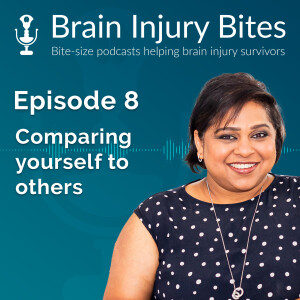
Tuesday Jan 04, 2022
Comparing yourself to others
Tuesday Jan 04, 2022
Tuesday Jan 04, 2022
In this episode of Brain Injury Bites, Brooke Trotter and Ashwini Kamath explore the pressure to compare yourself to others, especially on social media, and how that affects recovery after a brain injury.
Brooke shares candid experiences of scrolling through Facebook and feeling left behind, along with how fatigue, isolation and the invisible nature of brain injury fed into those feelings. Together, they talk about the importance of shifting focus away from what others are doing and towards what really helps.
They explore:
Why social media can fuel low mood and self doubt
The difference between online confidence and real life anxiety
Comparing your fatigue to others who “just feel tired”
The importance of perspective, patience and self compassion
How fitness, fundraising and routine can give you purpose
Letting go of people who do not understand your condition
Whether you are living with a brain injury or supporting someone who is, this episode is a reminder that your journey is valid and you do not have to keep up with anyone else.
Resources:
Episode eight - Comparing yourself to others - Information Sheet
For additional resources, and transcript, follow the link below:
Episode 8: Transcript
To keep up to date with our podcast, follow us on our social media accounts:
Twitter
Facebook
Instagram
Community Compass app!
Brain Injury Bites is now part of the Community Compass app! Download now and take the first step toward reclaiming your best life - because you’re not alone in this journey.
Google Play
Apple App Store
Notice:
Information and other content provided in this Podcast should not be taken as providing medical advice or recommendations. Please always consult your doctor or treating team for medical advice.
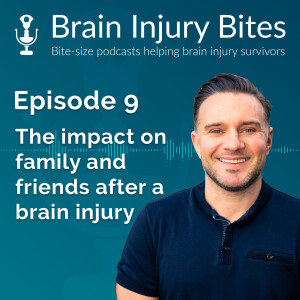
Tuesday Jan 11, 2022
The impact on family and friends after a brain injury
Tuesday Jan 11, 2022
Tuesday Jan 11, 2022
In this episode of Brain Injury Bites, Brooke Trotter and Ashwini Kamath explore how brain injury affects not just the survivor but everyone around them. From parents and siblings to lifelong friends and new acquaintances, they reflect on the emotional toll and relationship changes that follow a serious injury.
Brooke shares how his family initially treated him like royalty and how that protective bubble slowly gave way to a new reality. Ashwini highlights the often ignored grief that family and friends experience, and the importance of education and support for those supporting someone with a brain injury.
They explore:
How families cope with the trauma of a loved one’s brain injury
The emotional shift from survival mode to long term recovery
The invisible toll on parents, partners and siblings
Why old friendships may fade and new ones form
The value of empathy, patience and brain injury education
Where to find support for carers and why it is just as vital
This episode is a reminder that brain injury affects the whole support system and that understanding and help should extend beyond the person with the injury.
Resources:
Episode nine - The impact on family and friends after a brain injury - Information Sheet
Helpful links:
Headway: https://www.headway.org.uk/
Brain Injury Group: https://www.braininjurygroup.co.uk/
BASIC: https://www.basiccharity.org.uk/
UKABIF: https://ukabif.org.uk/
For a transcript, follow the link below:
Episode 9: Transcript
To keep up to date with our podcast, follow us on our social media accounts:
Twitter
Facebook
Instagram
Community Compass app!
Brain Injury Bites is now part of the Community Compass app! Download now and take the first step toward reclaiming your best life - because you’re not alone in this journey.
Google Play
Apple App Store
Notice:
Information and other content provided in this Podcast should not be taken as providing medical advice or recommendations. Please always consult your doctor or treating team for medical advice.
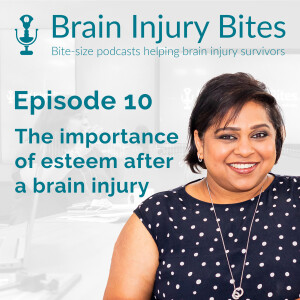
Tuesday Jan 18, 2022
The importance of esteem after a brain injury
Tuesday Jan 18, 2022
Tuesday Jan 18, 2022
In this episode of Brain Injury Bites, Brooke Trotter and Ashwini Kamath delve into the connection between self-esteem, purpose, and recovery after a brain injury. From early confusion and lost identity to building confidence through public speaking and blogging, Brooke reflects on how he found new meaning after his injury.
They discuss how the pressure to return to work or feel “productive” can clash with the invisible symptoms of brain injury. They also discuss finding ways to feel valued that align with your abilities, energy, and personality — whether that involves employment, volunteering, or something more creative.
They explore:
Why losing your job or role can impact your self-worth
Building confidence through purpose-driven activities
Brooke’s journey into public speaking, blogging and fundraising
Why comparing yourself to others can be damaging
Finding work or structure that fits your recovery
Practical advice for returning to work, setting goals and managing expectations
This episode serves as a reminder that purpose does not necessarily mean a nine-to-five job and that building self-esteem after a brain injury requires time, patience, and support.
Resources:
Episode ten - The importance of esteem after a brain injury - Information Sheet
For a transcript, follow the link below:
Episode 10: Transcript
To keep up to date with our podcast, follow us on our social media accounts:
Twitter
Facebook
Instagram
Community Compass app!
Brain Injury Bites is now part of the Community Compass app! Download now and take the first step toward reclaiming your best life - because you’re not alone in this journey.
Google Play
Apple App Store
Notice:
Information and other content provided in this Podcast should not be taken as providing medical advice or recommendations. Please always consult your doctor or treating team for medical advice.
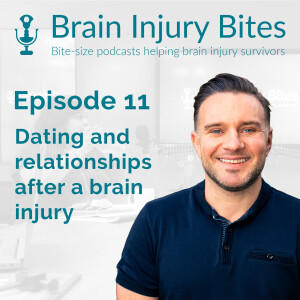
Tuesday Jan 25, 2022
Dating and relationships after a brain injury
Tuesday Jan 25, 2022
Tuesday Jan 25, 2022
In this episode of Brain Injury Bites, Brooke Trotter and Ashwini Kamath discuss dating and relationships after brain injury, from awkward first dates to more profound questions of identity, confidence and communication.
Brooke shares personal stories from his early experiences with dating apps, speed dating and social anxiety, as well as the emotional challenges that came with memory problems, fatigue and wanting to “seem normal.” Together, they explore the impact that brain injury can have on both new and long-term relationships.
They explore:
How brain injury affects confidence, spontaneity and communication
The emotional and cognitive impact of dating with memory problems
Navigating honesty, timing and how much to share with new partners
The pressure to return to who you were before the injury
Understanding what long-term partners and carers may go through
Why relationship education and support are just as important for spouses
Whether you're looking to meet someone new or support a partner through recovery, this episode offers honest insight into the emotional realities of love, dating, and connection after brain injury.
For a transcript, follow the link below:
Episode 11: Transcript
To keep up to date with our podcast, follow us on our social media accounts:
Twitter
Facebook
Instagram
Community Compass app!
Brain Injury Bites is now part of the Community Compass app! Download now and take the first step toward reclaiming your best life - because you’re not alone in this journey.
Google Play
Apple App Store
Notice:
Information and other content provided in this Podcast should not be taken as providing medical advice or recommendations. Please always consult your doctor or treating team for medical advice.
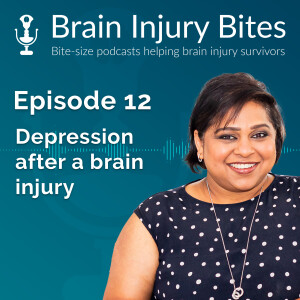
Tuesday Feb 01, 2022
Depression after a brain injury
Tuesday Feb 01, 2022
Tuesday Feb 01, 2022
In this episode of Brain Injury Bites, Brooke Trotter and Ashwini Kamath talk openly about depression after a brain injury — how it shows up, why it is often misunderstood, and what can help.
They explore the emotional crash that comes after the hospital bubble, the pressure to be grateful for surviving, and the quiet burden of invisible symptoms like fatigue, low mood and memory problems. Brooke shares what helped him manage darker days, from seeing a neuropsychologist to using simple tools like notes, structure and social connection.
They explore:
Why sadness and depression are not the same
The link between recovery awareness and emotional wellbeing
Feeling like a burden and struggling to share how you feel
Why routines, exercise and staying connected really matter
Managing energy dips and the negative thinking they bring
Practical advice for building resilience and seeking help
Whether you are living with a brain injury or supporting someone through recovery, this episode offers clarity, reassurance and small but powerful steps to support emotional health.
Resources:
Episode Twelve -Depression after a brain injury - Information Sheet
Helpful links:
Hidden Disability store
Mind: the mental health charity
Headway: Brain Injury Identity Card
For a transcript, follow the link below:
Episode 12: Transcript
To keep up to date with our podcast, follow us on our social media accounts:
Twitter
Facebook
Instagram
Community Compass app!
Brain Injury Bites is now part of the Community Compass app! Download now and take the first step toward reclaiming your best life - because you’re not alone in this journey.
Google Play
Apple App Store
Notice:
Information and other content provided in this Podcast should not be taken as providing medical advice or recommendations. Please always consult your doctor or treating team for medical advice.
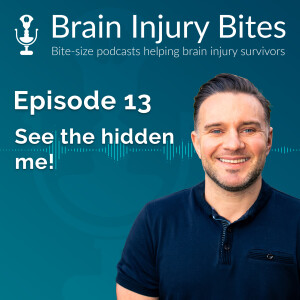
Tuesday May 17, 2022
See the hidden me!
Tuesday May 17, 2022
Tuesday May 17, 2022
In this episode of Brain Injury Bites, Brooke Trotter and Ashwini Kamath explore the hidden challenges of living with an invisible disability, as part of Action for Brain Injury Week and its theme, “See the Hidden Me.”
They discuss what it means to live with a brain injury that may not be obvious to others, and how common assumptions about disability often ignore the reality of symptoms like fatigue, anxiety, memory problems and sensory loss. Brooke shares his personal experience of looking fine on the outside while dealing with difficulties that are often misunderstood or dismissed.
They explore:
What makes brain injury an invisible disability
The impact of memory lapses, anxiety and lack of insight
Feeling misunderstood by strangers and even loved ones
The quiet frustration of symptoms that others cannot see
How small worries, like whether the door is locked, can spiral
Practical strategies that support daily life and wellbeing
Whether you are living with a brain injury or supporting someone through their recovery, this episode offers understanding, empathy and simple ideas to help manage the unseen effects of brain injury.
Helpful links:
Headway UK: Information library
Headway UK: Brain Injury Identity Card
For a transcript, follow the link below:
Episode 13: Transcript
To keep up to date with our podcast, follow us on our social media accounts:
Twitter
Facebook
Instagram
Community Compass app!
Brain Injury Bites is now part of the Community Compass app! Download now and take the first step toward reclaiming your best life - because you’re not alone in this journey.
Google Play
Apple App Store
Notice:
Information and other content provided in this Podcast should not be taken as providing medical advice or recommendations. Please always consult your doctor or treating team for medical advice.
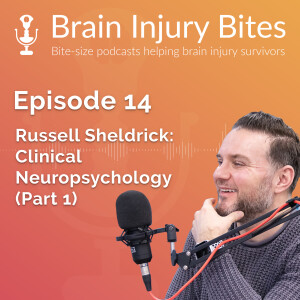
Monday Oct 02, 2023
Neuropsychology After Brain Injury (Part 1): Mental Health & Acceptance
Monday Oct 02, 2023
Monday Oct 02, 2023
In this episode of Brain Injury Bites, Brooke Trotter and Ashwini Kamath are joined by consultant clinical neuropsychologist Russell Sheldrick for a powerful conversation about recovery, resilience and the emotional journey after a brain injury.
Russell shares his experience working on an acute rehabilitation ward and explains how neuropsychology helps patients build awareness, develop coping strategies and regain confidence during early recovery. Brooke reflects on the pivotal role Russell played in his own rehabilitation, from memory exercises and emotional support to building realistic goals.
They explore:
What neuropsychological rehabilitation looks like in the early stages
Why insight, motivation and support are vital to recovery
The emotional impact of learning what has changed after injury
Strategies for memory, attention and adapting to cognitive challenges
Why recovery does not stop after two years
The importance of structure, self-compassion and pacing your progress
Whether you are recovering from a brain injury or supporting someone who is, this episode offers professional insight, real-life experiences and encouragement to keep moving forward, at your own pace.
For a transcript, follow the link below:
Episode Transcript
To keep up to date with our podcast, follow us on our social media accounts:
Twitter
Facebook
Instagram
Community Compass app!
Brain Injury Bites is now part of the Community Compass app! Download now and take the first step toward reclaiming your best life - because you’re not alone in this journey.
Google Play
Apple App Store
Notice:
Information and other content provided in this Podcast should not be taken as providing medical advice or recommendations. Please always consult your doctor or treating team for medical advice.
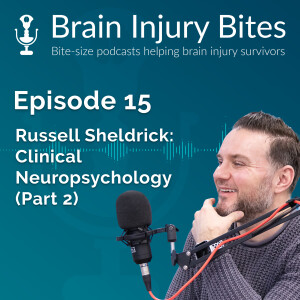
Tuesday Oct 03, 2023
Neuropsychology After Brain Injury (Part 2): Adjusting to a New Identity
Tuesday Oct 03, 2023
Tuesday Oct 03, 2023
In this episode of Brain Injury Bites, Brooke Trotter and Ashwini Kamath continue their insightful conversation with consultant clinical neuropsychologist Russell Sheldrick, exploring recovery, acceptance and the role of family support in brain injury rehabilitation.
They discuss how unrealistic expectations can hinder progress, and why true recovery often begins when people accept how life has changed. Russell explains how neuropsychology works with families to create the right environment for recovery, and why small adjustments can make a big difference.
They explore:
Why acceptance is not giving up but a starting point for adapting
Supporting family and friends through their own emotional journey
The impact of overwhelm, fatigue and sensory overload in daily life
Learning how to socialise differently while still enjoying life
The concept of post traumatic growth and finding positives after injury
What neuropsychological assessments involve and how they help shape rehabilitation
Whether you are navigating brain injury yourself or supporting a loved one, this episode offers honest discussion, practical strategies and encouragement to embrace progress, however slow it may seem.
For a transcript, follow the link below:
Episode Transcript
To keep up to date with our podcast, follow us on our social media accounts:
Twitter
Facebook
Instagram
Community Compass app!
Brain Injury Bites is now part of the Community Compass app! Download now and take the first step toward reclaiming your best life - because you’re not alone in this journey.
Google Play
Apple App Store
Notice:
Information and other content provided in this Podcast should not be taken as providing medical advice or recommendations. Please always consult your doctor or treating team for medical advice.










